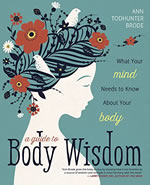Our Summer Book Review Issue is Live
We're pleased to share our Summer Book Review Issue, volume 6, number 2, 2016 with our loyal community members and passersby--folks visiting our blog...
Tea with Winnicott
Tea with Winnicott does seem like a real conversation with the acclaimed psychoanalyst, and allows the reader to develop a personal understanding of Winnicott as not just a figure of modern psychoanalysis, but as a regular person. Often funny and charming, Winnicott ends up capturing your attention and perhaps even your heart, creating a valuable place on the shelf to reflect on the importance and value of Winnicott.
The Intelligent Body: Reversing Chronic Fatigue and Pain from the Inside Out
Written by Kyle Davies
Foreward by Gabor Mate
Reviewed by Monica Spafford
In The Intelligent Body: Reversing Chronic Fatigue and Pain from the Inside Out, author Kyle...
BOOK REVIEW – The Little Book of Being
Winston’s new guide offers helpful advice for both novice meditators and experienced meditators looking to improve their practice. The concept of "natural awareness" can seem vague at times, and Winston repeatedly defines it throughout the book. However, her “glimpse” exercises and anecdotes help the guide feel more engaging and the concept of natural awareness to feel more accessible.
Worried? Science investigates some of life’s common concerns
Worried? seeks to relieve some of our anxiety by teaching us to take control of the situations that cause us to worry. The authors claim that taking control involves “critically evaluating potential threats, determining what poses the greatest danger, and prioritizing your actions to minimize adverse outcomes” (pg. 2) and this is exactly what they achieve in their book.
Sex Addiction As Affect Dysregulation: A Neurobiologically Informed Holistic Treatment
Alexandra Katehakis’ book dives into the foundations of sex addiction and the best possible treatment of it through a neurobiological lense. Informed by her own experiences and therapeutic journey as well as her work as a psychotherapist, Katehakis offers her own conception of an approach to treatment called Psychobiological Approach to Sex Addiction Treatment (PASAT). PASAT combines “cognitive-behavioral containment of addiction, transpersonal psychology expanding the self beyond the individual, and emotionally regulating, intuitive, and relation-based psychotherapy informed by affective neuroscience” (4). The target audience is mainly psychotherapists as the book hones in on PASAT and how to utilize it, but it can also be appreciated by those dealing with sex addiction, whether they’re in recovery or not. Through Katehakis’ detailed examination of sex addiction as a legitimate disorder and her resulting treatment plan, it is clear that she is deeply passionate and knowledgeable about the subject.
The book opens with a foreword by Allan N. Schore followed by Katehakis’s introduction where she touches on her journey to becoming a psychotherapist and provides an overview of the book. She describes a deeply traumatic experience of her own that drew me in. My attention was captured by her explanation of her personal connection to psychotherapy; it humanizes her and serves as a way to broach the topic of psychotherapeutic treatment.
The Garden of Love and Loss
By Judith Sarah Schmidt, PhD
Reviewed by Nancy Eichhorn, PhD
Books come to me at the moment I need them. It may sound strange that a...
The Shattered Oak: Overcoming Domestic Abuse and a Misdiagnosis of Mental Illness
I finished reading The Shattered Oak: Overcoming Domestic Abuse and a Misdiagnosis of Mental Illness and realized I hadn’t drawn a full breath since page one. At some points in the text, I simply stopped breathing. The character’s voice drew me in. Barbara’s first-person voice created an impact. She was distant in moments, disconnected from reality, and then smack dab in the brunt truth of her situation. She sounded emotionally and developmentally stunted; considering the content of her experiences, her tone of voice and language use rang true.
User Friendly: How the Hidden Rules of Design are Changing the Way We Live,...
I found myself fidgeting and incomplete after only six hours of a power outage at my house yesterday. Needless to say, every day we wake up to our alarms beeping like a virtual mom then head to the espresso maker bringing fresh smells of the day within seconds. Our driver is on his way to pick us up through applications such as Uber. We unconsciously check our phones five times in a minute so we can engage with our friends across the globe with several taps and clicks on the little shining screens. It’s not inaccurate to say that we are all ‘cyborgs’: we are half human, half machine. We are incomplete without technology.
Simple Self-Care for Therapists: Restorative Practices To Weave Through Your Workday
The primary concern of Simple Self-Care for Therapists is to break down Bush book for website effective methods to combat burnout and work-related stresses specific to practicing psychotherapists. In addressing this, Bush outlines myriad common scenarios coupled with personal anecdotes to illustrate what the scenarios might look like.














